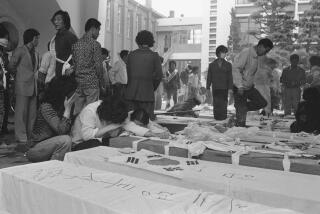Hit Man for Apartheid Insists He Always Followed Orders
- Share via
PRETORIA, South Africa — Convicted death squad leader Eugene de Kock confessed Tuesday to four terrorist bombings of anti-apartheid and church groups in London and South Africa during the 1980s but insisted that he acted under official orders at all times.
The former police colonel also admitted a horrific litany of other offenses, including torching a Pretoria building with elderly nuns sleeping inside. He also spoke of dynamiting an insurgent’s house in Botswana that he later discovered had “deaf and dumb children inside,” though it was unclear what happened to the youngsters.
“Today it’s one of the crosses, the burdens, that I have to bear,” De Kock said in a rare display of remorse during his second day of testimony at a pre-sentence hearing after his conviction last month of 89 crimes, including six murders.
De Kock headed the infamous Vlakplaas police counterinsurgency unit from 1983 to 1993. On Tuesday, he blamed his former masters for the hit squad’s ruthless rampage of death and destruction. He named at least 20 senior police and political officials who he said directed or approved his deadly missions against the African National Congress and its allies in the anti-apartheid movement.
In his most sensational charge, he said he was told that Pieter W. Botha, then president of South Africa, personally authorized the May 1987 bombing of Cosatu House, the Johannesburg headquarters of the black trade union movement. It was the first officially sanctioned bombing inside the country.
“It was one of the few times I was speechless,” De Kock recalled. “I couldn’t believe it. I said, ‘Now we’re talking about doing terrorism inside our own borders.’ ”
In September 1988, De Kock’s unit joined other police teams to bomb Khotso House, the Johannesburg offices of the South African Council of Churches. At least 23 people were injured when the six-story building collapsed. But De Kock said Adriaan Vlok, then minister of law and order, later congratulated the bombers at a barbecue.
“He said we would never give up,” De Kock recalled. “We would fight the ANC forever. We would stay in power for 1,000 years. I remember thinking that the last person to say that was Adolf Hitler.”
At the time, Vlok publicly expressed condolences to the injured and said police were conducting a comprehensive investigation. Neither he nor Botha could be reached Tuesday. Botha, now retired and living in seclusion, has said he has nothing to apologize for.
In his testimony, De Kock cited cases in which he said he was instructed or authorized to break into homes, execute prisoners, blow up bodies, embezzle police funds and tamper with evidence. Several detectives and an attorney general scribbled notes in the front row as he spoke; a prosecutor said charges were likely against some of those named.
Flip Hattingh, De Kock’s lawyer, said the defense aims to prove that De Kock was not a rogue cop running a renegade operation, as former apartheid leaders now claim, but a skilled officer who followed orders and was highly decorated for fighting the dirty war to perpetuate white rule.
“He was doing his job,” Hattingh said, but added: “That doesn’t exonerate him. It’s not a defense. Nuremberg proved that to us.”
De Kock won his force’s highest award, the Police Star for Outstanding Service, after he joined a covert team that bombed ANC offices in London in March 1982 using components smuggled into Britain in the South African Embassy’s diplomatic pouch. De Kock said his job was to “neutralize” guards at the ANC office, if necessary, while others set the time bomb. He was already en route to Brussels when the bomb exploded, causing extensive damage.
De Kock said he also worked with the Civilian Cooperation Bureau, the benignly named dirty tricks unit in the military, to bomb Community House in Cape Town in late 1987. The United Democratic Front, a key anti-apartheid coalition, used the building along with local church groups.
“The damage was very severe,” De Kock recalled. “We listened to [then Anglican Archbishop] Desmond Tutu’s telephone, and he was very upset. He said they lost everything.”
In another case, he said, the police Security Branch asked him to burn a building in Pretoria used by the South African Bishops Conference. After De Kock and his team lighted the blaze with cans of gasoline, he said, he was shocked to discover that elderly nuns were sleeping inside.
It was unclear from the testimony and available records what happened to the nuns. But “I felt very bad about it,” De Kock said of the incident. “It was never my forte to attack church people.”
Still, De Kock described only one covert operation that he turned down. He said a police brigadier asked him to “intimidate” a group of activists by shooting at their windows. De Kock refused. “It wasn’t our style,” he explained. “If we wanted to intimidate you, we just went for you.”
In all, De Kock has now confessed under oath to personally executing or supervising the brutal slayings of scores of people. Hattingh said he doesn’t expect De Kock to be charged, however, since he already faces several life sentences. He noted that De Kock was prepared to testify against his former bosses.
After court had adjourned, De Kock said he still had much more to say.
“The rest I’ll tell the Truth Commission,” he said, referring to the panel, headed by Tutu, that is investigating apartheid-era crimes. De Kock has applied for amnesty from the commission, but no date has been set for his hearing.
More to Read
Sign up for Essential California
The most important California stories and recommendations in your inbox every morning.
You may occasionally receive promotional content from the Los Angeles Times.












